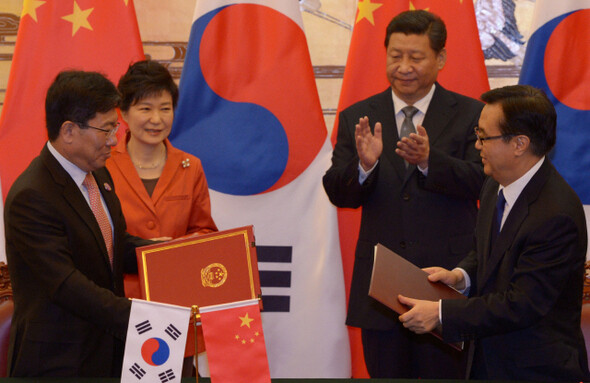hankyoreh
Links to other country sites 다른 나라 사이트 링크
Obama makes candid remarks on Trans-Pacific Partnership

US President Barack Obama spoke somewhat candidly on Dec. 3 about his country’s aims with the Trans-Pacific Partnership (TPP).
The remarks about the TPP, a framework for integrating twelve Asia-Pacific markets into a single free trade zone, came during a round table with business leaders in Washington.
“One of the ancillary benefits of the Trans-Pacific Partnership is to create high standards in the region that then China has to adapt to, as opposed to a race to the bottom where . . . China is really setting the terms for how trade and investment should operate,” Obama said at the gathering.
He went on to emphasize the benefits the partnership would bring to US businesses and workers alike.
“[I]f we are able to get Trans-Pacific Partnership done, then we’re actually forcing some countries to boost their labor standards, boost their environmental standards, boost transparency, reduce corruption, [and] increase intellectual property protection,” he said.
The remarks suggest Washington intends to use the TPP framework to maneuver the Chinese economy toward a market-centered system along US lines.
Negotiations for the TPP are currently in their final stages. If they are successful, the result would be the world’s single largest free trade zone, with a GDP equivalent to 40% of the entire global economy.
The US has recently been hurrying to complete the negotiations, while keeping Beijing outside the loop. The strategy appears to be one of first forging an agreement with a high level of openness and US-style market norms, after which China would be pressured to meet the standards when it signs on later.
Much of the TPP demands market openness and norms roughly on par with the current South Korea-US Free Trade Agreement (KORUS FTA). One particular target is the abolition of special treatment for state-owned enterprises - an Achilles heel for the Chinese economy.
“Some people are reading the TPP as the US’s attempt to ‘contain’ the Chinese economy, but it would be more accurate to call it an ‘engagement’ strategy, where they‘re trying to making China’s state-run economic system more like the US one,” said a source at one Washington think tank who was briefed on the ongoing talks by the US TPP negotiation team.
So far, China has been answering the push with its own maneuvers, proposing early negotiations last month for the less open Free Trade Area of the Asia-Pacific (FTAAP) framework and setting up a “Silk Road” infrastructure fund - nicknamed “China‘s Marshall Plan” - with the Asian Infrastructure Investment Bank (AIIB). The investment bank and Silk Road fund have the aim of supporting developing Asian economies with infrastructure investment, while also enlisting them on China’s side.
With the US and China jockeying fiercely for economic power in the region, South Korea has been particularly anxious about joining the TPP. The Ministry of Trade, Industry and Energy and business groups are becoming increasingly insistent that the reality of the international division of production means South Korea needs to get in on the US-led TPP quickly. If South Korea gets stuck outside the framework, they argue, it will fall far behind economic rival Japan; if it joins, it can share in the rewards of boosted regional trade.
But many trade and foreign affairs experts are advocating a more cautious approach, if not outright opposition. In particular, they are claiming that the benefits of TPP membership are overstated, and that the risks of an additional South Korea-Japan FTA haven’t been properly examined.
Another issue is that by being left out of the TPP negotiation loop, South Korea is being denied transparent access to information about the outcome. Meanwhile, many are complaining about the “steep admission price,” with the US pressuring for the acceptance of additional automobile, pharmaceutical, and financial industry demands in implementing the KORUS FTA as a precondition for joining the TPP.
By Park Hyun and Seong Yeon-cheol, Washington and Beijing correspondents, and Jung Se-ra, staff reporter
Please direct questions or comments to [english@hani.co.kr]

Editorial・opinion
![[Editorial] Does Yoon think the Korean public is wrong? [Editorial] Does Yoon think the Korean public is wrong?](https://flexible.img.hani.co.kr/flexible/normal/500/300/imgdb/original/2024/0417/8517133419684774.jpg) [Editorial] Does Yoon think the Korean public is wrong?
[Editorial] Does Yoon think the Korean public is wrong?![[Editorial] As it bolsters its alliance with US, Japan must be accountable for past [Editorial] As it bolsters its alliance with US, Japan must be accountable for past](https://flexible.img.hani.co.kr/flexible/normal/500/300/imgdb/original/2024/0417/6817133413968321.jpg) [Editorial] As it bolsters its alliance with US, Japan must be accountable for past
[Editorial] As it bolsters its alliance with US, Japan must be accountable for past- [Guest essay] Amending the Constitution is Yoon’s key to leaving office in public’s good graces
- [Editorial] 10 years on, lessons of Sewol tragedy must never be forgotten
- [Column] A death blow to Korea’s prosecutor politics
- [Correspondent’s column] The US and the end of Japanese pacifism
- [Guest essay] How Korea turned its trainee doctors into monsters
- [Guest essay] As someone who helped forge Seoul-Moscow ties, their status today troubles me
- [Editorial] Koreans sent a loud and clear message to Yoon
- [Column] In Korea’s midterm elections, it’s time for accountability
Most viewed articles
- 1[Column] The clock is ticking for Korea’s first lady
- 2Samsung barricades office as unionized workers strike for better conditions
- 3[Editorial] When the choice is kids or career, Korea will never overcome birth rate woes
- 4[News analysis] After elections, prosecutorial reform will likely make legislative agenda
- 5S. Korea, Japan reaffirm commitment to strengthening trilateral ties with US
- 6Why Israel isn’t hitting Iran with immediate retaliation
- 7[Guest essay] How Korea turned its trainee doctors into monsters
- 8Japan officially says compensation of Korean forced laborers isn’t its responsibility
- 9[Editorial] Does Yoon think the Korean public is wrong?
- 10[Editorial] 10 years on, lessons of Sewol tragedy must never be forgotten